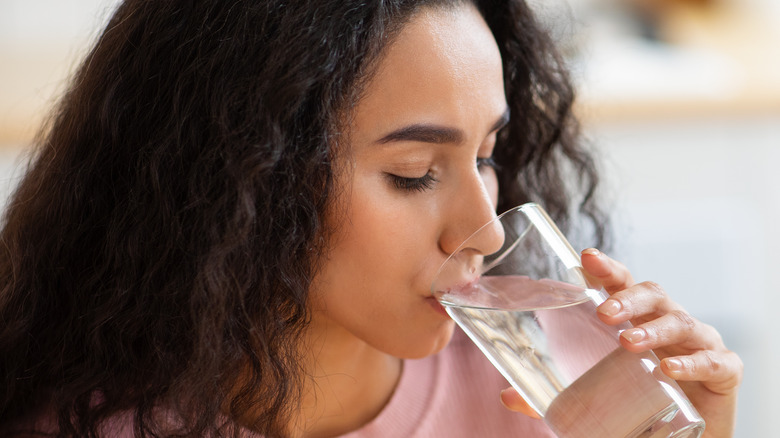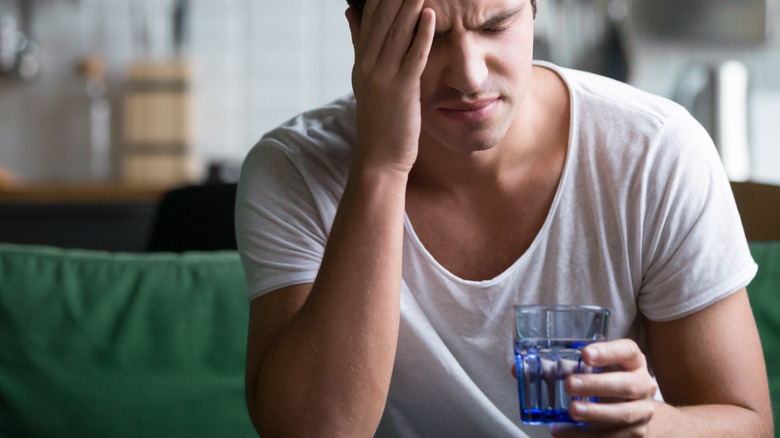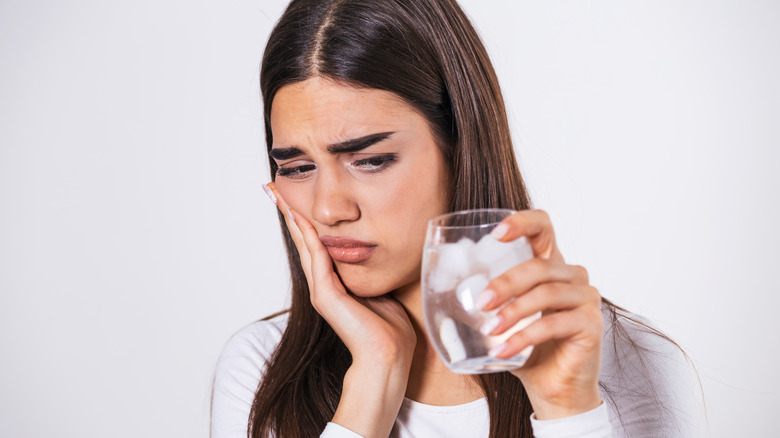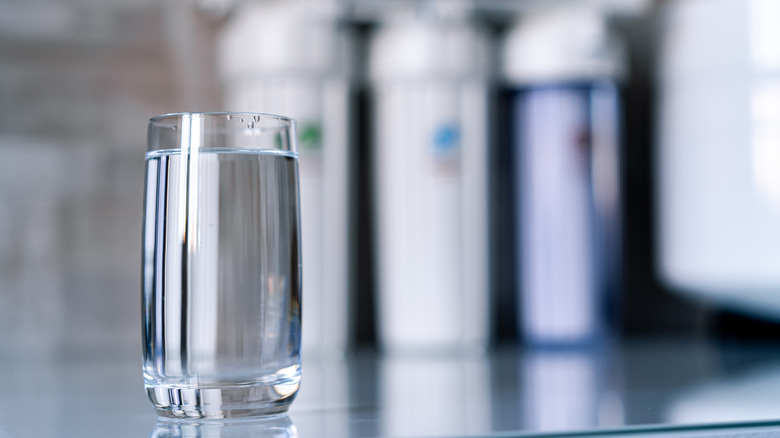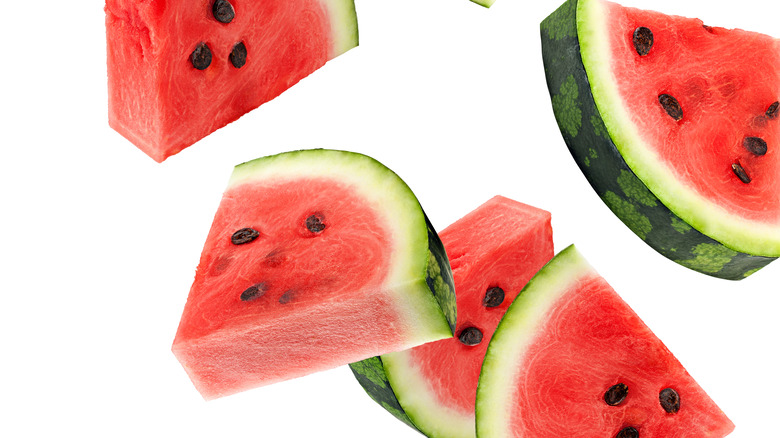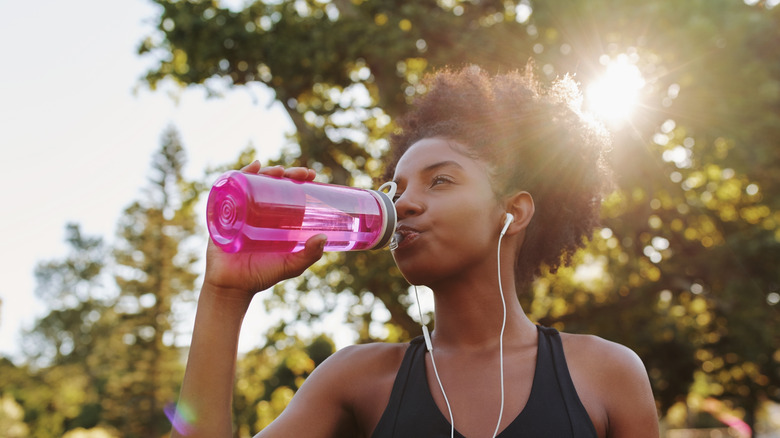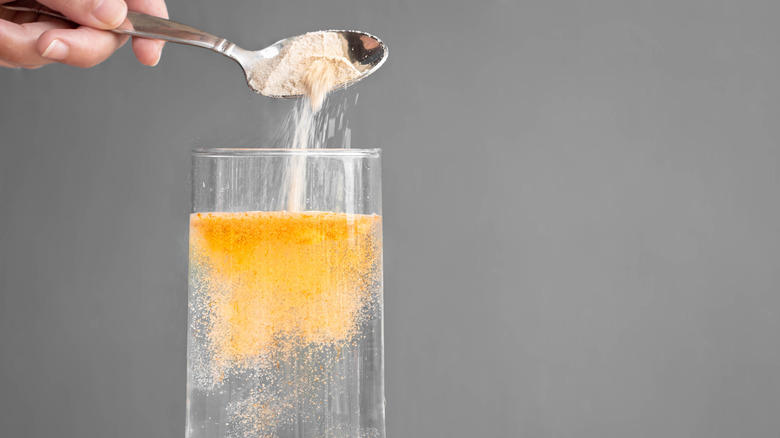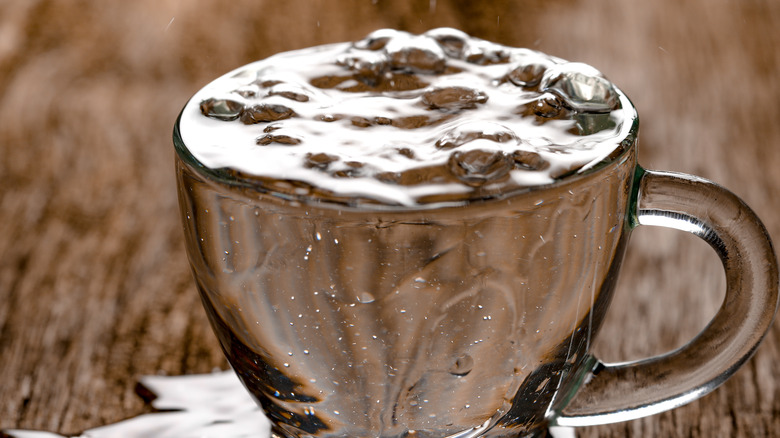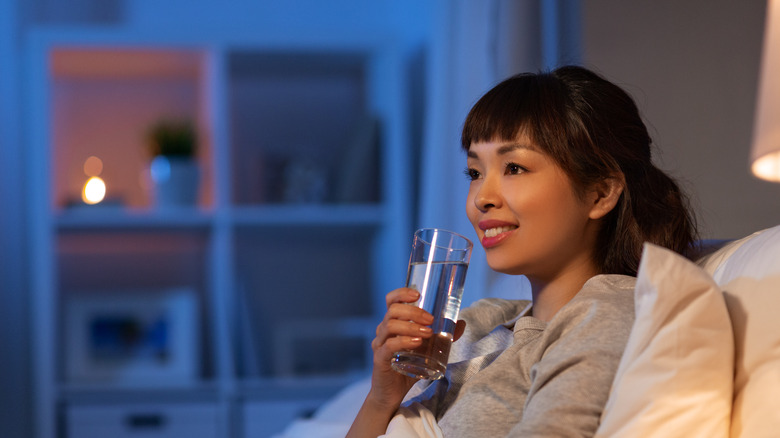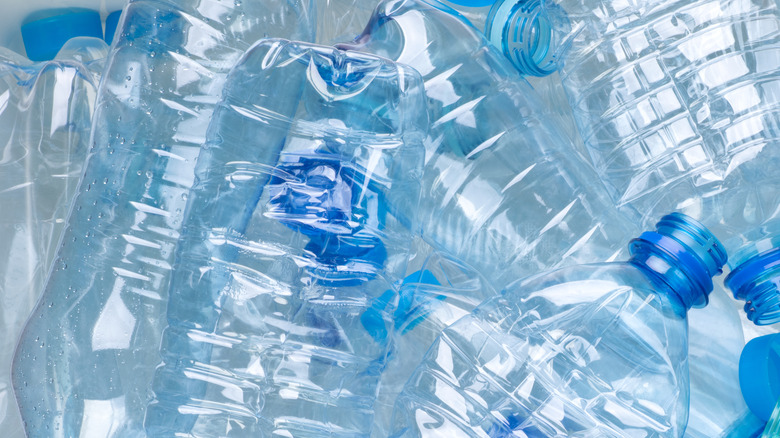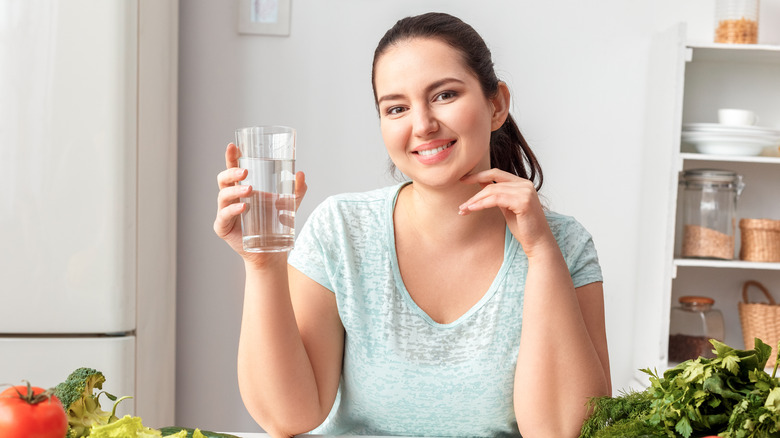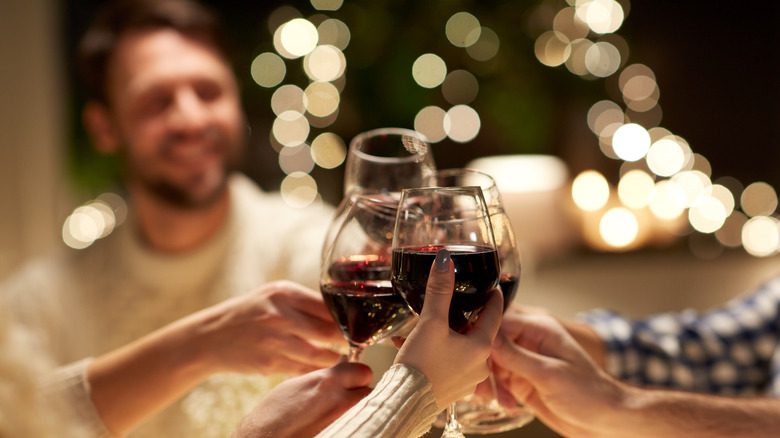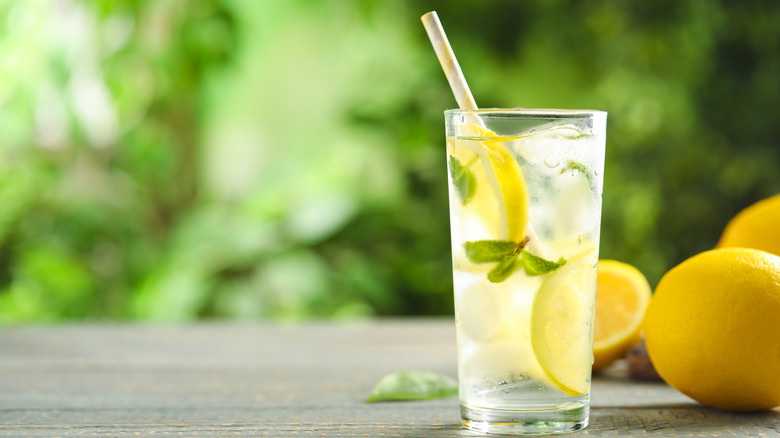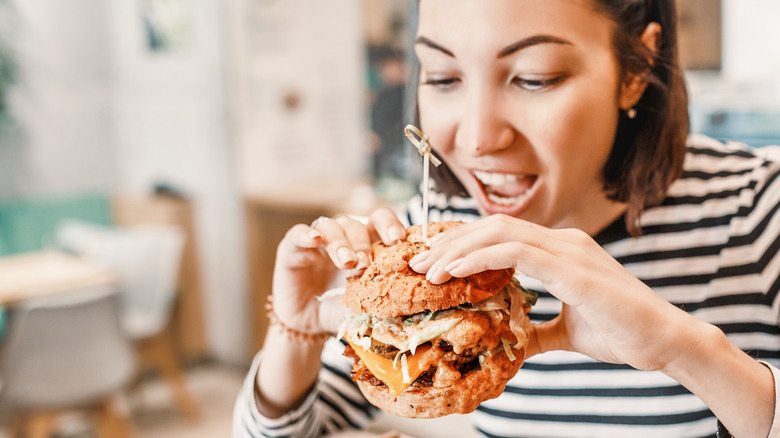Mistakes You're Probably Making When Drinking Water
Drinking water doesn't technically seem like something you could do "wrong." How many factors could there possibly be that influence the correctness of one of the most basic survival instincts? More than you might guess. While it might be a stretch to say there is a "wrong" way or a "right" way to drink water, there are certainly things you could be doing to improve your water-drinking habits to benefit your overall health. For being such a simple substance, having healthy water drinking habits can bring so many changes to your overall well-being, including weight loss, an increase in energy, reduced stress, and improved digestion just to name a few (via WebMD).
On the flipside, a lack of hydration can increase the risk of kidney stones, poor cognitive function, fatigue, and constipation (via CDC). If you're not used to drinking a lot of water, it might be a bit of an adjustment to integrate it into your routine — but it can be done. Keep reading to discover 14 new ways to help inspire you get your water routine in tip-top shape.
You're not drinking enough
It's safe to say that the recommendation to drink eight glasses of water each day is probably deeply ingrained in everyone's psyche. While it sounds smart, there are a few holes in this plan. Firstly, how much is a glass? To be safe, it's probably best to let go of this tightly-held theory and get clear on the facts. According to WebMD, the actual amount of water you need each day will vary depending on several factors. According to the site, the Institute of Medicine reports men need approximately 3 liters of water each day, while women need slightly over 2, and pregnant women will need about a cup more than that.
This will also vary based on how much physical activity you're doing, whether you are in a hot climate, or whether you have an illness or a condition that is causing you to lose water (think diarrhea). There is no 1-size-fits-all formula for how much to drink, so according to the site, the best way to find out is to pay attention to your thirst levels, and to look at your urine. Clear-to-pale urine means you're hydrated, and darker urine means you need more water.
You only drink it ice cold
An ice cold, refreshing glass of water when you need it most is the stuff dreams are made of. It's easy to only see water in this light, but let's not pigeonhole this life-giving beverage just yet. There are a myriad of benefits on the other end of the thermometer (and somewhere in the middle too), that can help you in surprising ways. You may be privy to the Ayurvedic theory that room temperature water is best, but unfortunately it's not that simple.
There are actual benefits to drinking it iced, such as it helping to regulate your body temperature when working out, and helping to burn extra calories because of the energy it takes your body to warm it up (via Healthline). However, drinking warm or hot water has its pluses too. According to Healthline, some of the potential benefits of drinking hot water include decreased nasal congestion, improved digestion, improved circulation, and decreased stress levels. Furthermore, if you live in a cooler climate, a warm cup of water with herbal tea might be extra motivation to reach your water intake for the day.
You're not drinking filtered water
While many Americans don't think twice before turning on the tap to pour a glass of water, the truth of what's in your water may not be so appetizing. According to Healthline, your tap water may be affected by "physical, biological, chemical, and even radiological contaminants." On its website, The Environmental Protection Agency noted Americans should expect their water to contain "at least" a small amount of some contaminants, which include nitrogen, bleach, pesticides, viruses, metals, and even uranium.
If that reveal makes you feel, well, uneasy, cue water filters. Rick Andrew, director of the NSF International Global Water program, spoke to Healthline and explained how they work: "Different pitcher filters have different types of media in them, depending on the brand — most use activated carbon to reduce contaminants and impurities. Activated carbon works through adsorption, meaning that it attracts the contaminant molecules and they adhere strongly to the carbon." Water pitchers, such as Brita, which are thankfully inexpensive, can remove some of the aforementioned impurities as well as lead, mercury, chlorine, and more.
Filtration systems can also be purchased to purify water in your sink, fridge, or even your entire home, but are more costly.
You're not eating hydrating foods
For those who might be bored by the idea of drinking all this water, there is hope for you yet. While the following solution will help to supplement the amount of water you have to drink in a given day, it won't completely replace it, sorry to say. According to science, adding hydrating foods to your diet is an excellent way to help you meet your water needs. To start, Healthline reports watermelon as one of the most hydrating foods you can eat, providing half a cup of water per one cup of the fruit.
An added bonus? Watermelon is a low-calorie fruit that is also known to assist in weight loss. Cantaloupe is another melon that made it onto the list that is made of 90% water. Again, one cup of this fruit provides a half cup of water, and it also has an extra dose of fiber which can help with digestion and increase feelings of satiety. Cucumber, oranges, lettuce, and even plain yogurt made it onto the list of hydrating foods, according to the site. Of course, reaching for a glass of water throughout the day is key, but adding these healthy foods to your diet can't hurt.
You're not drinking water during and after a workout
As mentioned, there are several factors that will determine how much water you need to drink each day, and whether or not you're working out is one of them. Even then, how much water you'll need to drink will vary based on personal factors including how much you sweat, the intensity of your exercise, and the climate (via FamilyDoctor). According to the American Council on Exercise, you can lose more than 1 quart of water in one hour of exercise, and if it's not replaced you can quickly enter a state of dehydration.
Experts at the site explain that dehydration can cause fatigued muscles and an overall decrease in athletic performance. The council recommends drinking 17 to 20 ounces of water two hours before exercise, and 7 to 10 ounces every 10 to 20 minutes throughout exercise. After exercise, the council recommends measuring how much fluid you may have lost during exercise, and drinking 16 to 24 ounces of water per pound lost. Sports drinks may also be a good option to replace electrolytes for people who exercise any longer than 40 minutes.
You're not drinking water first thing in the morning
While a cup of coffee might be the first thing on your mind as soon as you wake up, making a pit stop at the water pitcher may be a better bet. Rania Batayneh, MPH, a nutritionist and the author of "The One One One Diet," spoke to Business Insider and explained why water is a great choice upon waking from a night's sleep. "Most people have their coffee first thing in the morning. Although it is a good source of antioxidants, it is also dehydrating. You can offset this with water," she explained to the publication. She said that six to eight hours — which is the recommended amount of sleep each night — is a long time for the body to go without water, so we typically wake up dehydrated.
She also suggests "shocking" the body with a glass of cold ice water first thing to "boost your alertness and low energy levels." Other benefits Batayneh mentions about drinking water first include helping to jumpstart your metabolism, and helping to fight sickness. Basically, the first thing that you do when you wake up will affect how the rest of your day unfolds. "If you feel sluggish, it will reflect in your activity (morning workout), productivity at work, and even your routine with the kids," she explained.
You're using drink mixes
When in the throes of boredom with your water routine, it can be enticing to "spice things up" by adding new ingredients into your water to make it more palatable. While some ingredients can support your health (which will be discussed ahead), others, well, not so much. Firstly, adding drink mixes with artificial sweeteners to your water can wreak major havoc on your health goals, and might be better left untouched (via Healthline). The site reported that artificial sweeteners found in sugar-free drink mixes may possibly cause headaches, depression, and may be damaging to the kidneys and heart. Many of these mixes in the market contain artificial colors such as Yellow 5, which according to more reports from Healthline, are linked to hyperactivity in children and even cancer.
Even if you're steering clear from artificial sweeteners, adding real sugar to your water isn't great either. According to WebMD, too much sugar is known to have adverse effects on your mood, weight, kidneys, and sexual health. If you absolutely must add a touch of sweetness to your water, natural sweeteners like Stevia or Monk Fruit extract can be healthier alternatives (via Healthline).
You're drinking too much
If you've made it this far in the article you've probably realized you're not drinking enough water. Gallon jugs in tow, you might be ready to accept the maximum hydration challenge, but before you start chugging feverishly, continue reading. As the saying goes, too much of a good thing can be a bad thing when it comes to water, too. Water intoxication is what happens when you drink more water than your body is able to expel. Although it is pretty rare, it's most likely to happen during high-intensity workouts or sporting events when you are hydrating constantly (via Medial News Today).
Symptoms of water intoxication include disorientation, nausea, and vomiting, according to Medical News Today. Drinking too much water reduces the sodium content in the blood, which can lead to a swelling of the cells. This swelling can be specifically dangerous to the brain, and can even be fatal in some cases. To avoid overhydrating, experts at the site suggest not drinking more than your kidneys are able to eliminate. Since the kidneys can only eliminate .8 to 1 liter per hour, do not drink more than that to err on the side of safety.
You drink water right before bed
While keeping a glass of water on your nightstand might be a great idea to encourage your morning sip, try to avoid sipping on it before drifting off to sleep. According to the sleep experts at The Sleep Foundation, drinking water right before bed can lead to disruptions in sleep. The site explained that while the production of urine is slowed down as we are sleeping, overdoing it on the water front can still lead to interruptions in sleep. While there are some benefits to drinking a little water before bed, especially if you live in a warmer climate or are feeling sick, it's good to be aware of the downsides, too.
Nocturia is described as the need to get up more than once per night to urinate. According to the foundation, these interruptions in sleep can lead to symptoms of sleep deprivation. To avoid nocturia it's recommended to slow down your water-drinking habits before bed, as well as your consumption of hydrating foods, alcohol, sugar, and caffeine. If you are dealing with dehydration, try to drink your water in the a.m., and throughout the day.
You drink water out of plastic bottles
For some, drinking water out of plastic bottles is all but passe. With all of the fancy glass and aluminum water bottles available and an increase in environmental awareness, you'd think that bottled water would no longer be a "thing," but the statistics show otherwise. According to the International Bottled Water Association, in 2020 the consumption of bottled water increased 4.2% from 2019, with retail sales growing 4.7% compared to the previous year.
According to the CDC, bisphenol A, otherwise known as BPA, a chemical that is found in many plastic bottles, is also present in 93% of Americans ages six and up. The center ran a urine test on 2,517 participants and discovered BPA in the urine of nearly all of them. According to research from Harvard University, many animal studies have been conducted that show the dangers of BPA, including malformation in the brain, breasts, and prostate during pregnancy. Russ Hauser, professor of environmental and occupational epidemiology at the Harvard School of Public Health, explained to the university's publication that, "At minimum, we want to reduce our exposure, whether it's from the water cooler bottle or the lining in a can of food." Good advice.
You're not drinking it before meals
If you find that your eyes are bigger than your stomach at meal time, taking a pause to have a glass of water before you eat may keep you from ordering that extra side of fries. According to Healthline, having a glass of water before eating can "enhance feelings of fullness," and keep you from overeating. Results from a study of 24 overweight and obese adults with an average age of 61 showed a 13% reduction in calorie consumption during meals when they were preceded by a glass of water. WebMD reported that another study conducted by the University of Birmingham in the U.K. found adults who drank 16 ounces of water before eating for 12 weeks lost an average of 2.87 pounds compared to those who did not.
Dr. Helen Parretti, who helped to author the study, said in a statement, "The beauty of these findings is in the simplicity," she explained. "When combined with brief instructions on how to increase your amount of physical activity and [get] on a healthy diet, this seems to help people to achieve some extra weight loss — at a moderate and healthy rate. It's something that doesn't take much work to integrate into our busy everyday lives."
You don't pair alcohol with water
One tequila, two tequila, three tequila... you know the joke. Enjoying a good (or a few good) drinks on occasion can be an excellent way to wind down, celebrate, and just let loose, but if you're not adding water between each of those tequilas, you're doing your body a major disservice. According to WebMD, alcohol is a diuretic, and for each drink you have, your body gets rid of at least four times that amount of liquid. Jim Woodford, PhD, a forensic chemist specializing in drugs and alcohol, spoke to WebMD and explained, "Alcohol dehydrates. When you wake up with a headache and a generally icky feeling, dehydration is the cause."
According to Healthline, some of the potential side effects of being dehydrated from alcohol include liver damage, kidney damage, skin damage, and the loss of cognitive function. Experts at WebMD suggest pacing yourself with at least an 8-ounce glass of water between each drink to alleviate the effects of dehydration. Another recommendation from the site: Put your drink on ice to water it down. This way you drink it more slowly as the ice melts, and you get the added bonus of more water.
You don't infuse your water
Another hack to turn what might be "plain old boring water" into something more tantalizing is infusing it. Take out your fancy water bottle, and slice up some fruits and veggies to prepare for a total water makeover. Some of the more widely known infusions include lemon, lime, and other citrus fruits, but herbs and even other veggies are also good options to enhance the flavor of your water (via WebMD). The site explained that the primary benefit of drinking infused water is that because the flavor is enhanced, it may encourage you to drink more.
While the science is still out on exactly how much of the nutrients the water itself is taking on, if the fruit (specifically citrus) is squeezed into the water, more nutrients can become available. Some fruits and herbs that you can infuse into your water include mint, basil, strawberry, kiwi, cucumber, and more (via Prairie View A&M University). Before you prepare your infusion, WebMD suggests making sure you clean your fruit properly to avoid contamination. Be sure to wash your hands and then rinse the fruit thoroughly before dropping it into the water — seal and refrigerate the remaining fruit.
You confuse thirst for hunger
It might seem strange, but according to science, there are times when that Big Mac craving may actually mean you need a glass of water. Alissa Rumsey, RD, spokesperson for the American Academy of Nutrition and Dietetics, spoke to Health and explained the reason for this phenomenon. "Mild dehydration is often masked as feelings of hunger, when really your body just needs fluids," she said. "Prevent it by staying on top of your fluid intake, starting with a glass of water first thing in the morning.
If you feel hungry, and you haven't drank much that day, try drinking a glass of water and waiting 15 to 20 minutes to see if your hunger subsides." The site explained that the part of the brain responsible for regulating hunger and thirst is the same. Sometimes, when you are feeling dehydrated, it can send mixed signals to your body which can manifest as an urge to want to eat.

